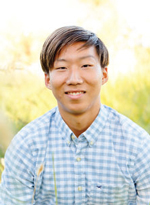
Nathan Pak Aliso Niguel High School 11th Grade
Occasionally, a teacher or a parent will remind me that he or she did not have direct access to knowledge and did not have the luxury of quickly finding an answer that is not in the back of a textbook. This makes me smile a little as I am unable to empathize the feeling of visiting the library and flipping through a seemingly endless flow of books. Instead, I can type into a search box that gives me millions of results in a matter of milliseconds.
The shift in my perspective of the Internet from an everyday resource to a dynamic interconnected system of information occurred as early as middle school. During this time, I believed it was a great opportunity to learn computer programming. But where would I start? Could the complexity and depth of programming languages be taught to oneself easily? Of course, starting off with zero background knowledge would have proven to be difficult, but the process, start to finish, was none like any other I have ever done in school. I scoured through multiple resources related to computer programming on the web. There’s only one thing that distinguished the Internet from other methods; its fast and easy accessibility.
At any given moment, one can learn just about anything. The commanders of the battles of Lexington and Concord? Sure. The longest word in the German language? Absolutely. Without much effort, finding a detailed answer can suddenly become simple and transform into a necessity of daily life without realizing it. If one wanted to know anything desired, a quick search will do.
It became evident that the information I needed would be the actual programming language. I sat before my laptop staring at an empty search box at the top of the browser, cursor blinking, thinking of a suitable language. Finally, PHP, a language specialized in the management of databases for websites, came to mind. However, in order to learn everything about PHP, I could not restrict myself to mindlessly reading everything I found. Tutorial videos formed the bulk of my understanding and learning. It was also necessary to find resources that would fill the missing spaces in my knowledge. This would clarify a few concepts: what attribute is used to receive keyboard input, how HTML integrated into PHP, and how files are transferred from server to server. Though it appears of little importance, identifying resources solidified my understanding of navigating the web.
To test my comprehension of PHP, I would routinely devise programs that challenged me to think critically. Nevertheless, errors were often assisted with friendly members of an online forum dedicated to programming. Not only were these people helpful but they also served as the warm center of the crowd reaching out. They help amateur coders get on their feet, discuss important topics, and contribute to large projects. Thanks to members of this community, web searches became much more constructive. If I encountered an obstacle, I confidently knew how to work around it.
These hours of learning eventually culminated in my knowledge of a new language. However, it is not the language that a legacy in my perspective as a student. Instead, it is the learning process itself that has challenged itself that has changed the way I approach an academic situation. I can use the internet to find answers and, more importantly, confidently know how to find them. At the same time, it is woven and connected with people around the world that have a purpose like mine, but it should not be taken for granted. This skill has proven to be extremely helpful and not just in education but also daily life, making the Internet truly within reach.
<
Nathan Pak Aliso Niguel High School 11th Grade>


